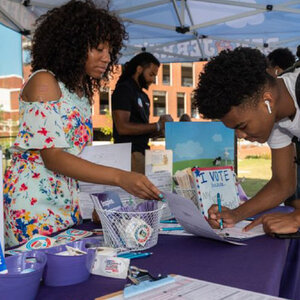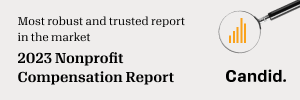Phillip Brian Harper, Program Director for Higher Learning, Andrew W. Mellon Foundation: Humanities as a component of social justice
February 9, 2022
Phillip Brian Harper joined the Andrew W. Mellon Foundation in October 2020 as program director for the new Higher Education grantmamking area. As part of the foundation’s new strategy to prioritize social justice in all of its grantmaking, the program supports inclusive humanities education and diverse learning environments, with a focus on historically underserved populations, including nontraditional and incarcerated students. In January 2022, the foundation announced grants totaling $16.1 million to 12 liberal arts colleges in support of social justice-oriented curricular development in the humanities.
A literary scholar and cultural critic, Harper previously served as dean of the Graduate School of Arts and Science at New York University and, prior to that, taught at Harvard University and Brandeis University. He is the author of Framing the Margins: The Social Logic of Postmodern Culture (1994); Are We Not Men? Masculine Anxiety and the Problem of African-American Identity (1996); Private Affairs: Critical Ventures in the Culture of Social Relations (1999); and Abstractionist Aesthetics: Artistic Form and Social Critique in African American Culture (2015).
PND asked Harper about the Humanities for All Times initiative, the role of a humanities education in advancing social justice, and the insights he brings to those philanthropic efforts as an academic and a writer.
Philanthropy News Digest: The grants awarded through the Humanities for All Times initiative will support curricula “that both instruct students in methods of humanities practice and clearly demonstrate those methods’ relevance to broader social justice pursuits.” Can you give an example of what such a curriculum might include?
Phillip Brian Harper: Yes, it would include courses that not only familiarize students with certain bodies of knowledge that are relevant to humanities inquiry—accessible, for instance, through a specific set of texts or in a particular archive—but also consciously and explicitly train students in humanities methods for conducting research and analysis on relevant materials: archival investigation, textual interpretation, oral history interviewing, etc.
Furthermore, it would provide students with some concrete demonstration of how those methods can be put to use in real-world social justice work. To give an example, one of the institutions that has received a Humanities for All Times grant, Austin College, will establish 18 different “humanities labs,” each of which would focus on a pressing social justice challenge—for instance, contestations over the definition of U.S. citizenship, appropriate modes of historical memorialization, or medical ethics questions raised by the COVID-19 pandemic—and deploy humanities methods in exploring potential solutions to it.
PND: What is the thinking behind the foundation’s focus on the humanities as a way to equip students better to address social injustices? What is it about the humanities that encourages community engagement?
PBH: It is the mission of the Mellon Foundation to support the arts and humanities, so that focus characterizes all of our work, not just the Humanities for All Times grants. Given that Mellon is an arts and humanities funder that is also a social justice foundation, the question that guides everything we do is not simply, “What is the best way to address social injustice?” Rather, it is, “How do the humanities figure in a socially just world?” They figure, in part, as a means for achieving justice, as the Humanities for All Times projects are intended to demonstrate: Not only is humanities analysis crucial in helping us to see how a just society can be forged, but the very question of exactly what constitutes a just society—which is fundamental to all instances of socially committed community engagement—is itself a humanities question.
[T]he humanities are not merely a tool for achieving social justice; they are also a component of it. The illumination the humanities provide is a social good in itself—because knowledge per se is a social good. The more we understand about the way our world works, the more able we are to make it work better.
That said, the humanities are not merely a tool for achieving social justice; they are also a component of it. The illumination the humanities provide is a social good in itself—because knowledge per se is a social good. The more we understand about the way our world works, the more able we are to make it work better. The humanities enhance our understanding in this regard in a particular way, just as the knowledge generated in non-humanities disciplines enhances our understanding of the world in other ways, and a truly just society is one in which everyone has access to humanities thought and insight. Everything we do at Mellon to promote the humanities we do with this broad understanding of social justice in mind.
PND: Are small liberal arts colleges better equipped than large universities to implement social justice-oriented curricula?
PBH: Small liberal arts colleges are not necessarily better equipped … but they are often better able to implement curricular change swiftly, and at a scale that both involves a maximum number of faculty members and reaches a relatively sizable proportion of the student population. Because we are interested in seeing results of our Humanities for All Times funding as quickly as possible, liberal arts colleges are the natural focus for our efforts in this regard.
PND: Is the issue of student diversity at the liberal arts colleges a challenge at all?
PBH: Frankly, while the issue of student diversity does indeed pose challenges not just at liberal arts colleges but across the entire higher education sector, those challenges pale in comparison to the ones raised by the relative lack of diversity among college and university faculties and, especially, institutional leadership. At this point, people of color account for approximately 50 percent of the national undergraduate student population, but only about 30 percent of postsecondary faculty members, 17 percent of college and university presidents, and 9.5 percent of all provosts. In determining whether to provide grant support to any given higher-ed institution, we give serious consideration to its record with respect to racial equity at all levels. We take an institution’s demographic diversity into account whenever we are considering whether to support it, because we want to be sure that the institutions we fund share the values that the foundation itself subscribes to.
PND: The Higher Learning program also has awarded grants in support of incarcerated students, including funding for prison education and library programs. Beyond ensuring incarcerated individuals’ rights to have access to books and learning opportunities, how do you see those programs helping to advance social justice more broadly?
Incarcerated persons are members of our society, and over 90 percent of them will ultimately be released. Enhancing their prospects for participating productively in the world beyond the prison walls is beneficial not only for them, but for that larger world.... I can’t think of anything that advances social justice more than broad access to education among all constituencies of society.
PBH: To provide incarcerated individuals with access to books and learning opportunity is to advance social justice more broadly. Incarcerated persons are members of our society, and over 90 percent of them will ultimately be released. Enhancing their prospects for participating productively in the world beyond the prison walls is beneficial not only for them, but for that larger world. To the extent that a healthy democracy depends upon an educated populace, I can’t think of anything that advances social justice more than broad access to education among all constituencies of society.
PND: In addition to your BA from the University of Michigan and PhD from Cornell University, you earned an MFA in creative writing from Cornell. How does your perspective as a writer shape your view of how the humanities address social justice?
PBH: It’s true that I earned an MFA in poetry writing at Cornell, and it’s also true that, since the beginning of my career as a professor, all of my poetic effort has been expended, not in the writing of poems per se, but in the drafting of my scholarly work. I’ve always thought of poetry as the art of expressing in words that which had previously seemed inexpressible, and I’ve tried to take a similar approach to my scholarly writing, in the belief that that which goes unarticulated cannot be productively addressed. In my view, it is precisely the job of the humanities to articulate truths that otherwise would remain obscured, which I think is the necessary first step in working to achieve social justice.
In my view, it is precisely the job of the humanities to articulate truths that otherwise would remain obscured, which I think is the necessary first step in working to achieve social justice.
To illustrate, an example of the potential social-justice effect of humanities knowledge I’ve found myself citing frequently during the last few years is the concept of intersectionality, or the idea that that various forms of social inequality tend to operate in tandem and exacerbate each other. Intersectionality is an idea from the humanities that has become quite current within popular social thought, and it is what allows us to understand the particular ways that, for instance, sexism and racism function together to condition the experiences of Black women in the United States. Without a theory of intersectionality to illuminate how African-American women’s experiences come to be shaped in particular ways, we cannot hope to substantially improve those experiences.
PND: You’ve published four scholarly books on culture and social relations, with a focus on African-American and other disadvantaged or disempowered communities. Since the events of 2020 that called for a national racial justice reckoning, there has been a greater focus on culture produced by people of color. Are you optimistic that this trend will contribute to progress toward racial and social justice?
PBH: I wouldn’t say that I’m optimistic about the results of any given trend, as trends by their very nature come and go, and there is no way to predict what long-term effects, if any, they will have. What I do know is that deeply incisive cultural work is being produced by people of color in this truly singular world-historical moment, just as it always has been, and that work will resonate long after the present crises have subsided. The question is whether those resonances will continue to register with audiences once our current moment has passed. It will be the responsibility of the humanities to ensure that they do.
It is the job of the humanities to ensure that all critically incisive cultural work—including that produced by people of color—continues to resonate; this is part and parcel of the illumination that the humanities provide. That illumination is itself a social good, and full access to it is a necessary component of a just society. Either we recognize this interconnection and work to foster it, or we fail to do so, and thereby fail to achieve the fully just society we are striving for.
PND: As a professor, you’ve likely seen the impact philanthropic support can have on students’ access to and success in higher education as well as on academic research. What is the most important insight you bring from your academic career to the foundation’s social justice efforts?
PBH: The most heartening observation that I bring from the 32 years I spent as a professor before joining the Mellon Foundation is that the insights generated within the context of higher education really do come to inform what we problematically refer to as “the real world” beyond the academy. I’ve never ceased to marvel at the fact that ideas to which I have tried to introduce my students through my teaching often become current within popular thought and discourse, though typically after a delay of several years. This makes me very hopeful, for if the insights generated within the academy do have value in social justice efforts—and I believe they frequently do—then the fact that students will carry them into their post-graduation lives means that the fight for social justice will inevitably go forward on multiple fronts, informed by just a bit more clarity of vision than it otherwise might be.
—Kyoko Uchida






